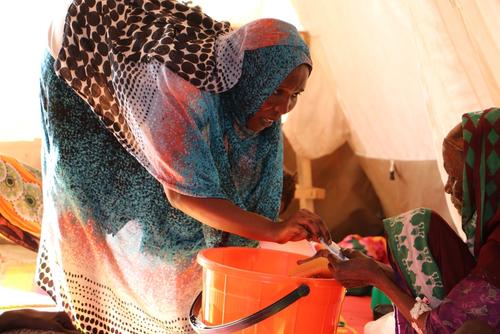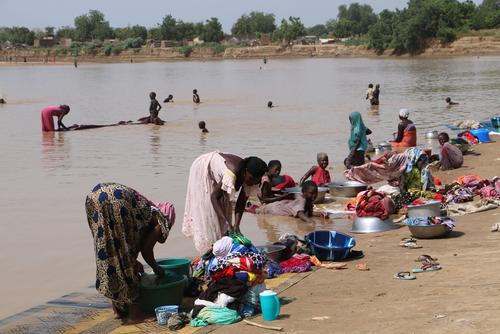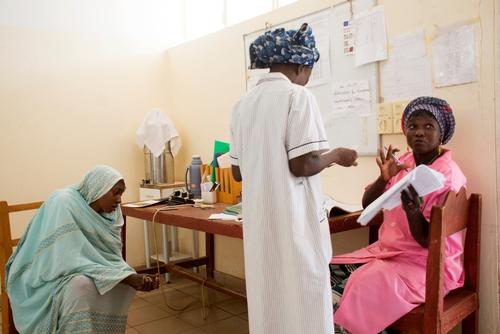The cholera epidemic declared on 18 September is ongoing in Chad’s Salamat region, where 795 cases and 23 deaths have been reported.
A cholera epidemic in Chad has followed the Bahr-Azoum River along its meandering path southward, from the eastern Sila region to the more heavily populated district of Am Timan, in Salamat, near the Central African Republic.
Many people wash and bathe in the river, and even drink from it.
As the epidemic shifted, Médecins Sans Frontières (MSF) moved its Chad Emergency Response Unit (CERU) from Sila to Am Timan. According to Chad’s Ministry of Health, 795 cases and 23 deaths were reported in the Salamat region between 11 September, when the first case was registered, and 14 November.
MSF’s CERU set up a 40-bed cholera treatment centre (CTC) in Am Timan on 22 September, followed by three smaller units in surrounding villages. As the community struggled to cope with increasing numbers of cases, the need to raise awareness about the waterborne disease became clear.
“The particularity here is the severity of cases,” said Dr Roger Haïwe, who is in charge of treatment activities at the CTC.
“Not only do patients have to travel far to get to the CTC, but they are also afraid to say they have cholera because it has a stigma attached to it.”
At the peak of the epidemic in mid-October, more than half the patients arrived severely dehydrated because they had waited too long to come to the CTC or had problems finding transportation. With only two ambulances in a region marked by rough rural roads and a bad phone connection, patients faced numerous obstacles to having treatment.
Villagers had trouble contacting the ambulance service in Kach Kacha, one of the affected villages in Am Timan district, where the only alternative was to take a costly motorbike taxi.
“They were too sick to be brought on motorbikes,” said Kach Kacha resident Ahmat Issa, who came to MSF’s CTC in Am Timan by ambulance along the bumpy and dusty 45-kilometre route.
Ahmat, 39, like many patients, fell sick after drinking water from the river while working in sun-baked fields. Farmers have been reluctant to walk to work with the heavy containers of drinking water necessary to get them through the day.
MSF emergency response activities have included the distribution of sachets for treating water – even from the river – so that it is safe to drink. These sachets are included in hygiene kits MSF health promoters distribute to all patients at the CTC. The kits also contain a 20-litre bucket for treating the water in, a bar of soap, a blanket and a mosquito net.
The need for awareness-raising
Inside the recovery tent, 90-year-old Amne Fadou is sitting on a mat with her new hygiene kit, which she can’t see because she is blind. Amne was sick in the shower in her village and had to be taken out because other people needed to use it. She was brought to the CTC alone as her carers were scared of being infected with cholera.
“I was vomiting and had diarrhoea – I thought I was dead,” she said.

To address the rising number of cases, a team from the Ministry of Public Health opened a small cholera treatment unit (CTU) in Kach Kacha. They enlisted the help of villagers to build a makeshift unit using tree branches and parts of a donated tent. One week later, the unit was overwhelmed and 17 patients were lying outside on the ground. MSF later assisted in setting up three additional 10- and 20-bed CTUs in Kach Kacha and other villages in the Am Timan district.
Cholera – which is spread by ingesting food or water contaminated with the faeces or vomit of someone carrying the disease – can be treated by immediately replacing the fluids and electrolytes lost through vomiting and diarrhoea. If untreated, patients may die within hours.
With children still playing in the potentially contaminated river, there was a clear need to inform the community about the importance of hygiene. MSF has been raising awareness in Am Timan and surrounding villages about hygiene, water treatment and cholera prevention. There are signs that people are becoming more informed, according to Dr. Haïwe, who said people initially turned up at the CTC at night out of shame.
MSF has also been conducting epidemiological surveillance to chart the evolution of the epidemic and needs.
“MSF and other NGOs need to have complete, up-to-date and reliable information so they can make informed decisions about the activities they implement,” said Jennifer O’Keefe, the MSF epidemiologist who is collecting and analysing the data daily.
Meanwhile, Ahmat, whose mother had been waiting for him, was being discharged after four nights in the CTC. He was very tired and said he could not stand up or eat. He said when he returns to work in the field – after the lengthy trip back to his village and a period of recovery – he will bring his own drinking water rather than drink from the Bahr-Azoum river.
The background
MSF received more than 950 patients in its cholera treatment facilities in Chad between14 August and 12 November. The Ministry of Public Health registered 1,186 cases and 73 deaths countrywide over the same period. Cases were largely concentrated in the Sila region near Chad’s eastern border with Sudan until the first suspected case was registered in Salamat on 11 September. According to the Ministry, there were 432 cases and 52 deaths in the Sila region, where MSF set up three cholera treatment units and an oral rehydration point.
As the number of cases dropped in Sila, MSF handed over its activities to the Ministry and redirected its resources southward in Am Timan, where cases were on the rise. MSF’s cholera treatment centre in Am Timan alone received 519 cases from 22 September to 14 November and three people died.
MSF has worked in Chad for more than 35 years. Teams run a project in Am Timan to support the district hospital and surrounding health centres, primarily in paediatrics and maternal health. In the region of Lake Chad, MSF also supports a regional hospital and provides primary care to displaced populations through numerous mobiles clinics. In Moissala, in the southwest region of Mandoul, MSF carries out seasonal malaria prevention campaigns.





